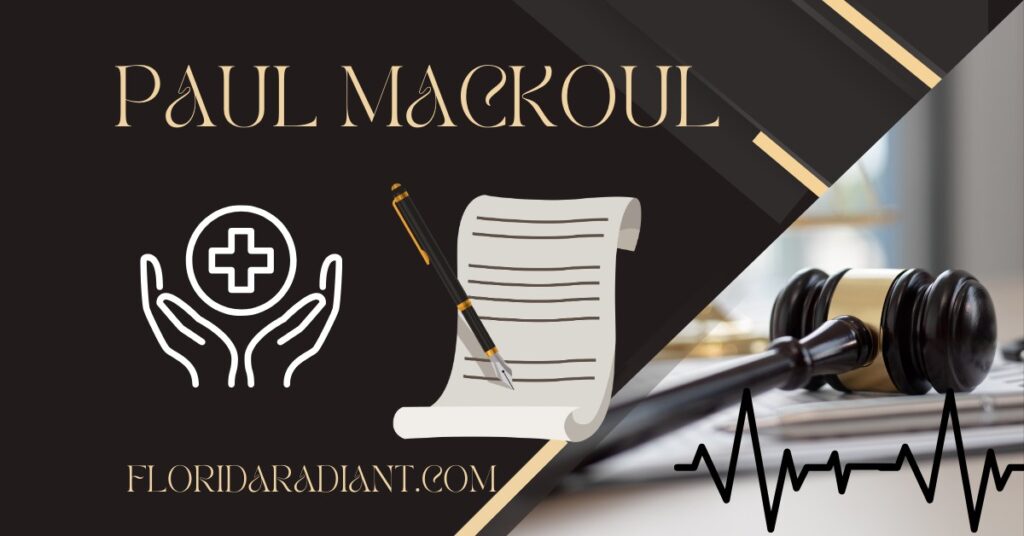Dr. Paul Mackoul is a respected figure in gynecology and oncology, known for his minimally invasive surgery techniques. As the co-founder of the Center for Innovative GYN Care (CIGC), Paul Mackoul has introduced groundbreaking approaches that have shaped gynecological care. With advanced methods like LAAM-BUAO and DualPortGYN, Dr. Mackoul’s work promises patients shorter recovery times and better outcomes.
However, public perception of Dr. Mackoul shifted when allegations surfaced, leading to a medical malpractice lawsuit against him.
This case sparked considerable media interest and raised concerns about patient safety, ethical standards, and the responsibility of healthcare professionals.
The legal accountability involved impacts both Dr. Mackoul’s reputation and the way his innovations are viewed in the medical community.
Dr. Paul Mackoul’s Biography and Career Highlights

| Aspect | Details |
|---|---|
| Defendant | Dr. Paul Mackoul, MD |
| Specialization | Gynecology and Oncology; expertise in Minimally Invasive Surgery |
| Associated Clinic | Center for Innovative GYN Care (CIGC) |
| Core Surgical Techniques | LAAM-BUAO, DualPortGYN |
| Primary Allegations | Medical Negligence, Lack of Informed Consent, Procedural Complications |
| Patient Complaints | Postoperative Issues (e.g., infections, chronic pain, tissue damage) |
| Emotional Toll on Patients | Claims of emotional and physical distress post-surgery |
| Legal Proceedings Status | Ongoing, with court hearings and expert witness testimonies |
| Defense Argument | Adherence to Medical Standards, Intrinsic Risks in Surgical Innovation |
| Impact on Medical Community | Heightened Scrutiny on Gynecological Procedures, Increased Focus on Patient Safety |
| Media Coverage | Significant, raising public awareness on medical malpractice and accountability |
| Potential Legal Outcome | Financial Settlements, Changes to Dr. Mackoul’s Practice Policies |
| Wider Regulatory Implications | Possible New Regulations for High-Risk and Innovative Medical Procedures |
| Ethical Concerns Highlighted | Balancing Patient Safety with Surgical Innovation, Medical Accountability |
Dr. Mackoul earned his medical degree from the University of Virginia and completed further training at George Washington University. Specializing in gynecological surgery, he soon gained recognition for his minimally invasive techniques.
His career focuses on reducing risks and improving patient safety, particularly through innovative procedures. His work has not only advanced gynecology but has also highlighted the complexities of surgical standards in healthcare.His contributions extend beyond practice, as his techniques in surgical innovation have influenced gynecologists globally.
Work with CIGC has helped patients facing complex conditions by providing alternatives to more invasive surgeries. However, these very innovations later became points of contention in the Paul Mackoul MD lawsuit, bringing his career under public scrutiny.
Allegations and Issues in the Lawsuit
The Paul Mackoul MD lawsuit centers on claims of medical negligence, with several plaintiffs alleging that his surgeries led to unexpected complications. Specific allegations include postoperative issues such as infections, chronic pain, and even permanent tissue damage.
Plaintiffs argue that these complications were preventable and have expressed frustration over the lack of informed consent prior to their procedures.
The lawsuit also emphasizes the emotional and physical distress experienced by these patients, raising questions about whether Dr. Mackoul’s practices met healthcare standards.
Some patients claim they were not fully informed of the potential risks associated with these procedures, which adds to the ethical responsibility required in such high-stakes medical care. These allegations highlight a critical issue of patient-doctor trust that is foundational to quality healthcare.
Legal Proceedings and Defense Strategy
The legal proceedings in this case have evolved through multiple stages, allowing plaintiffs and defendants to present their cases.
Dr. Mackoul’s defense strategy focuses on demonstrating his adherence to surgical standards and highlighting the complex nature of gynecological surgeries. He argues that his techniques were well within medical guidelines and that some surgical risks are unavoidable.
Supporting his defense, expert witnesses have provided testimony that backs up his commitment to patient care. They argue that surgical complications do not necessarily indicate professional misconduct.
The defense also points out that surgical innovation is often associated with risks and that these risks are minimized to the extent possible under his methods. This strategy is geared toward emphasizing the careful balance between healthcare standards and innovative surgical techniques.
Impact on Patients and the Medical Community
The Paul Mackoul MD lawsuit has had a profound impact on both patients and the medical community. For patients, the lawsuit represents a challenging reality in healthcare, where emotional distress and financial compensation often become necessary parts of recovery from surgical complications.
Patients involved in the lawsuit have faced medical expenses and a loss of trust in their healthcare providers, which has further intensified the case’s emotional toll.
In the medical community, the case has prompted increased scrutiny of gynecological surgery techniques. Medical boards and healthcare institutions are more closely examining protocols surrounding surgical innovation and patient safety.
This case has led some healthcare providers to implement more rigorous information fact-checking procedures, especially around informed consent. This shift reflects a growing awareness of medical ethics and accountability in the healthcare system.
Ethical Considerations and Medical Accountability
This case highlights several significant ethical considerations that healthcare professionals face, especially around informed consent and medical accountability. Patients place immense trust in doctors, and doctors, in turn, have a duty to maintain public trust in healthcare by acting transparently.
Cases like these stress the importance of explaining all potential risks to patients before performing innovative procedures.
The Paul Mackoul MD lawsuit brings forward the ethical issue of balancing surgical standards with the desire to introduce innovative surgical techniques.
The question of whether Dr. Mackoul should have conducted further studies on his methods reflects a broader concern in medical ethics about patient-centered care. Ultimately, the ethical responsibility in medicine goes beyond innovation—it requires a steadfast commitment to safety, clarity, and accountability.
Public Perception and Media Reaction

The media coverage surrounding the Paul Mackoul MD lawsuit has played a significant role in shaping public opinion. News outlets have portrayed the case from various angles, impacting public perception of both Dr. Mackoul and the safety of minimally invasive surgeries.
Some reports focus on his achievements in gynecological surgery, while others emphasize the claims of patient rights violations.
Similar cases have raised awareness of medical malpractice in the public eye, leading many to question the level of patient safety in specialized fields like gynecology.
This increased public scrutiny in media has made patients more cautious and has pushed healthcare providers to communicate clearly about surgical risks. The impact of media in cases like this illustrates the role of journalistic credibility in shaping health-related narratives.
Lessons Learned and Preventative Measures in Medicine
This lawsuit emphasizes critical lessons for both patients and healthcare providers. For patients, thorough preoperative communication and active questioning about surgical risks are essential. Patients should feel empowered to discuss all aspects of their healthcare and know their rights in such matters.
Clear understanding and patient education are essential to fostering patient-doctor trust.
Healthcare providers, meanwhile, can take this case as a reminder to adhere strictly to medical standards and document patient consent rigorously.
Preventative measures like enhancing patient screenings, providing detailed surgical explanations, and performing follow-up consultations can help maintain healthcare standards. Such practices not only prevent potential lawsuits but also improve the quality of care and strengthen public trust in healthcare.
Legal Outcome and Aftermath
The legal outcome of the Paul Mackoul MD lawsuit could have a lasting impact on the healthcare system. If the case resolves with a financial settlement or judgment, it may prompt regulatory bodies to impose additional surgical standards and oversight on innovative techniques.
Regulatory changes may ensure that similar lawsuits are avoided by establishing stricter guidelines for high-risk procedures.
For Dr. Mackoul, the aftermath of this case could bring adjustments to his practice or lead to increased documentation of informed consent in his surgical procedures.
The potential consequences reach beyond his practice, influencing the medical community and encouraging healthcare providers to follow transparent, accountable practices.
Conclusion: The Importance of Accountability in Medicine
The Paul Mackoul MD lawsuit highlights the essential role of accountability in maintaining ethical, patient-centered care. For healthcare to earn the trust it requires, professionals must act transparently, prioritize patient safety, and practice with integrity.
This case serves as a reminder that medical accountability is crucial in a field that holds life-changing responsibilities.
As medicine continues to advance, it’s vital to ensure ethical standards align with the pace of innovation. The lessons from this lawsuit are invaluable for shaping future medical practices, as they underscore the importance of clear communication, accountability, and unwavering commitment to patient welfare.
What led to the initial allegations in the Paul Mackoul MD lawsuit?
Patients reported unexpected complications and questioned the risks involved in certain procedures.
How has the Paul Mackoul MD lawsuit affected patient trust in healthcare?
The case has made patients more aware of the importance of informed consent and safety standards.
What are some potential outcomes of the Paul Mackoul MD lawsuit?
Possible outcomes include financial settlements, increased regulation, and adjustments in Dr. Mackoul’s practice.
Why is surgical innovation a topic in the Paul Mackoul MD lawsuit?
Dr. Mackoul’s innovative techniques are central to understanding the risks and benefits of modern procedures.
How has media coverage shaped public perception of this lawsuit?
Media attention has heightened public awareness, influencing opinions on medical malpractice and accountability.

William James is an experienced blogger with a passion for writing informative, easy-to-read content. As the voice behind Florida Radiant, William shares his knowledge on a wide range of topics, making complex ideas simple for readers. His goal is to provide valuable insights that are accessible to everyone, helping readers stay informed and engaged.







